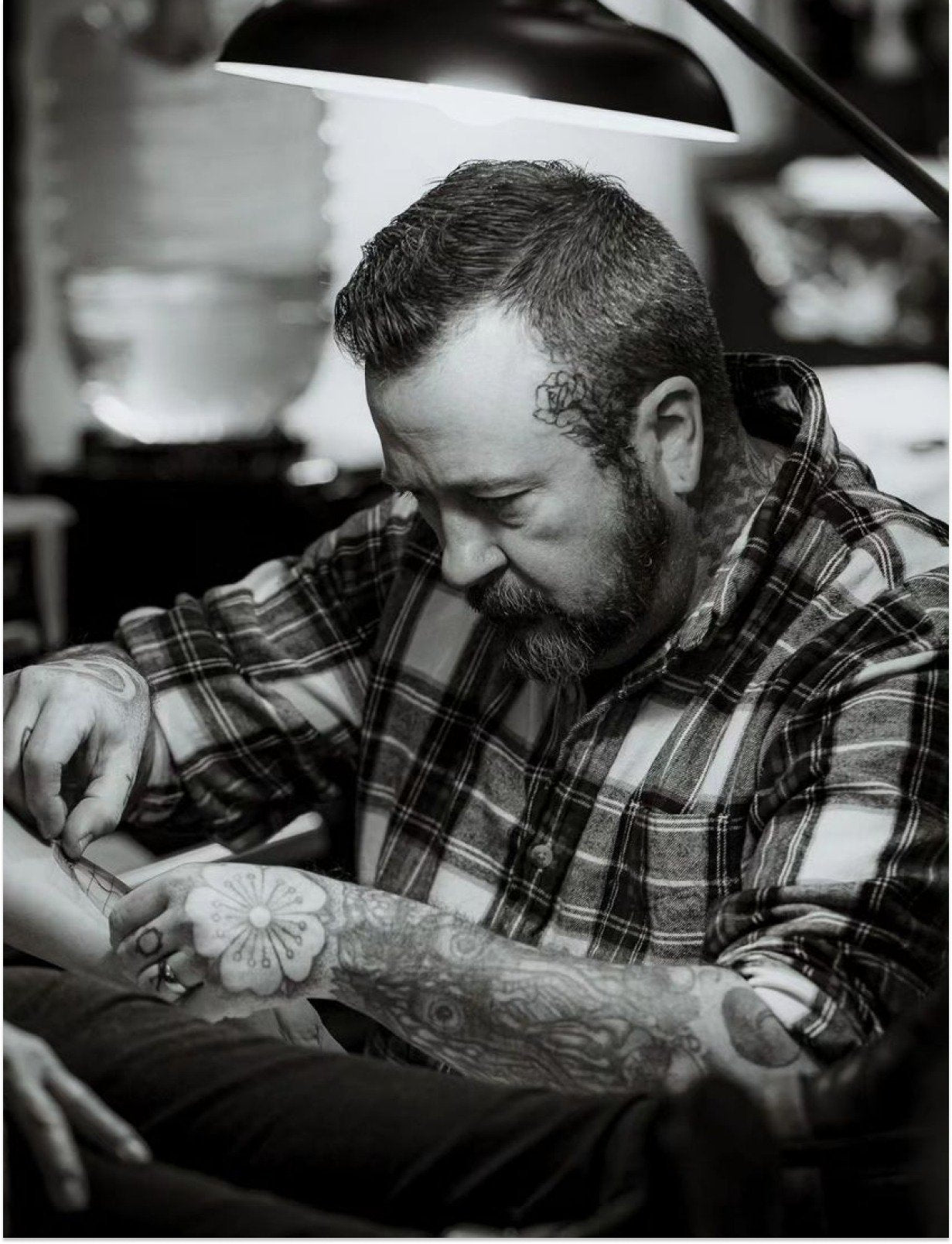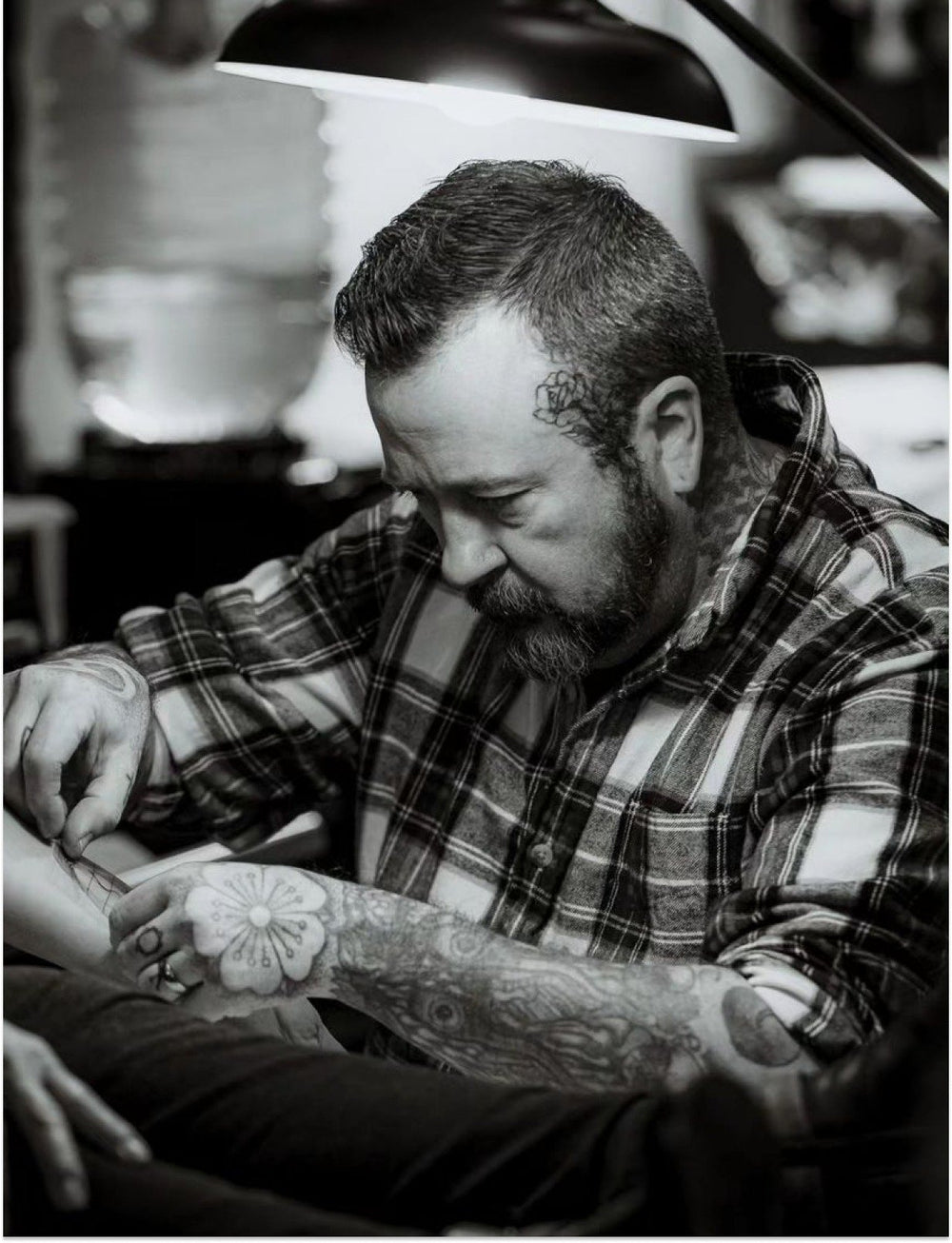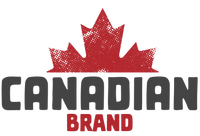Chris Hall Talks The Arcana Tattoo Tarot Event and Freemason Secrets?…

Patrick Coste: Professor Sir! Chris Hall, thank you for taking the time to talk with us. This chat is overdue eh!?
Chris Hall: Absolutely! It’s my pleasure Patrick, and yes, we talked about doing this during Covid. Time flies!
PC: Chris we're gonna go through a few regular questions, then I’ve got a few that have me very intrigued… Lol!
First, tell me about your tattoo upbringing and how you made it, alive, to 2024… How long have you been tattooing for?
CH: About 24 years? Roughly…
PC: So you've seen a quarter century of tattooing evolution here. You've witnessed the changes from “Tattoo TV” to today!!

CH: Just before the TV shows started coming out, and then seeing all the shifting happening from that exposure, to the advent of social media and how THAT’s changed things.
PC: How did you find the transition? Did you find it hard or did it go smoothly?
CH: Social media and the TV (shows) have definitely given tattooing more exposure than it's ever had before. It's made it much more accessible, much more popular, and social media has definitely enhanced the speed and capability at which artists, I think, are growing and becoming more competent and more confident in their abilities.
Information is easily accessible now whereas before, tattoo artists had to go to libraries or they had to find reference, or go to nature, or whatever. Now, you can open your iPad and look at Instagram and you can find three different references for a tattoo. Whether it's another tattoo or real life or whatnot, you can assemble a tattoo in a much more proficient way, with a higher degree of skill and execution than before because there's a lot more readily available.
PC: What are your weapons of choice when it comes to tattooing? Are you a pen user?
CH: Ironically, I've been at Grey Harbour for just over a year now and I've always been the last, sort of, hold out on switching over, you know? I've been running coil machines for a really long time and it took me a long time to come around on the rotary idea. Working with Andrew at Cottage 13 here in Hamilton, Andrew was always trying to throw new things in my hand, working with Eikon and stuff and I was like, “I'm comfortable with what I've got. I know where I'm going. I know how I'm working.”
Not that I was averse to learning something new or taking that on. I'm just like, “Not right now, it's not the time for me.”
He was making all those jokes about being the old guy, gatekeeping and trying to keep it loyal to the coil or whatever. I finally came around and I got myself a pen.
I've been using some more rotaries, like direct-drive rotaries, and linear-drive stuff before… Like Neotat, I’ve been using a few of those over the last couple years. I finally just got my hands on a low level pen setup. I switch back and forth between the coils and the pen, and rotary machines.
PC: That’s very cool. You didn't have to switch, like some people did because of their hands…
CH: I've been having issues with my hands for sure, for so long, because of the coil vibration. The tension in your hands from stretching and holding the machines, and being crunched over for eight hours a day definitely catches up, you know? Especially getting older, things take their toll on you. I'm certainly back and forth between the two.
PC: Let's say, you did it before you had to…
CH: Yeah, yeah. I've heard a lot of people say that they switched because they felt that they had to. I never found it that way. I found out, for myself personally, the pain came more from the stretching hand and holding the machine. I also find the pain can be just as tough for that sometimes, because of the deliberateness with which you have to tattoo.
Maybe you have to have a deliberate reaction, as opposed to your coil machine where there's a little more give. I feel like it can move a little quicker with coils.
PC: This creates a balance with the machine as well, right? There's people who will never know about that.
CH: Absolutely. Yeah, because people are coming right out and you just wrap up your pen and switch cartridges and away you go. No making needles. No cleaning tubes and whatnot, right?
PC: We could talk about machines for a while eh? Lol! Tell me more about how you got into tattooing…
CH: I was working in restaurants. At the time I was a cook, and I was friends with some of the other guys that I worked with in the kitchen, and one of the guys was a drummer in a band. The bass player from their band was a tattooer named Phil in Barrie, Ontario. I was doing some painting and drawing. I went to college for graphic design, and ended up going back into cooking because it was a little easier to work and make money that way.
My friend Brian, the drummer, introduced me to tattoos and said, “Hey, you know, you draw and stuff, maybe you could talk to Phil about learning how to tattoo.”
All of a sudden, I started apprenticing with Phil at the shop in Barrie, it was called Ink Fetish.
It was sort of that traditional shop, you know? I was working 30-something hours a week at the restaurant and the other free time I had, I was down in the shop, cleaning up, trying to do line drawings, making needles and rolling joints for Phil…Lol.
You know… Trying to reassemble tattoo machines, the good life. The classic tattoo apprenticeship, right?
PC: So you DID apprentice?
CH: Essentially, in a traditional sense; cleaning up and just kind of like earning, earning your keep before actually getting to do any tattooing or anything.
PC: Was it a rough apprenticeship, or a cool one?
CH: I wouldn't say it was rough… It was an ‘in’ for me. Looking back, the calibre of tattooing wasn't really high. The skill level wasn't really there from the people that I was learning from.
I knew and recognized that, and then I figured I needed to get better. I moved on from that shop and went to Lucky Devil, and I started working with a couple of better artists there. At that time I was working with Chris David from Government Street, and Derek Lewis who owns Lewis Family Tattoo Company in Roncesvalle. So, I got exposure to those guys there.
I spent a couple of years between the Lucky Devil in Newmarket and Barrie. I ended up at Way Cool Tattoos in North York at Yonge and Sheppard, and so I started with Matthew Ellis at Seven Crowns. Matt had some art school experience and I definitely learned a lot more about art fundamentals and art skills working with him, and started to understand how to paint better, which is great especially in tattooing.
PC: That must have helped you develop your skills to be quicker, faster?
CH: Yes definitely, although I still can't draw a backpiece in half an hour while somebody's getting a coffee… It WAS a way to increase speed.
PC: It’s like those clients who get a backpiece in two days… It gets to be hard on the tattooer AND the client. I would die after four hours or something like that.
CH: Lol, yes! I don't really do a lot of large stuff. I do a lot of small to medium things and I don’t book myself too much in advance. I'm not a super-busy tattooer. I'm just kind of a broad range, well rounded, utility tattooer. Coming up in the street shops, it’s how I am now.
PC: So you can whip pretty quick, and well, from what I see.
CH: I'm pretty quick and I'm pretty efficient, and I can do a lot of things across the board. I love that and it relates to art.
PC: That's good. Tell me a pivotal moment in your tattoo career. Like THE moment you can say made a difference.
CH: A definite pivotal moment in my career was working at Good Point Tattoos. I guess I'd tattooed for about 10 years. I would like, break into a cold sweat with stress when I started a tattoo, no matter what it was.
I think it finally just kind of stopped when I felt the shift in my confidence. I'm not really sure where that came from. I guess maybe I just pushed myself a little harder and recognized that I needed to work a little more, diligently draw and stuff. So at one point, my confidence caught up and then my skill set started to get better.
I wasn’t as afraid of failing and taking risks, so I was taking more risks and getting better because I was doing different things with drawings. I adopted a better work ethic, made it less stressful. I guess I made it a little easier to understand that what I was doing was ok and I was getting better, and I could get better even still.
Again, working at Good Point, the progression of things. I started working with better people, better artists. When you see everybody around you is creating incredible things, you gotta keep up!
PC: You’re now at Grey Harbour, you’d been at Cottage 13 for about 9-10 years… Great artists at both shops. Both seem to be artist-driven shops, and I can tell that painting is a passion of yours. Tell me more about your past, and future, in the painting realm.
CH: I’d say I've been painting for about 30 years. Right after college I started dabbling in acrylic painting. I learned how to do some watercolour tattoo designs along the way. I really had nothing else to do when the lockdown happened, I just sat in the studio space in my dining room and started painting. A lot of ideas came to mind, connecting with galleries and other artists here from the fine art side of things, not necessarily tattooing.
There was a freedom of not dealing with clients and not trying to fit their ideas into a box, and just explore things that resonated with me. Then I became very involved in the art community here. I've made a name for myself in the fine art community as well in the last couple of years by doing so, which kind of brings everything full circle to the Paul Elia Gallery here in town and the art show.
I've done a number of fine art shows here in town. I had one with Steven James. We had a tandem show at Paul’s gallery that was more of a fine art thing than it was a tattoo thing. Like, we didn't build it for tattooing. We kind of maintained a separate entity and a separate Instagram presence for fine art.
PC: Your face doesn't show that you're a tattooer per se, you know?
CH: Good, lol! They all assumed that I was a painter.
PC: Must feel good in a sense?
CH: It does, I mean there's a certain incognito to it, you know? I didn't have the pressure of being the tattooer who needed to please.
Now I'm back to tattooing. The pendulum swung the other way. Tattooing is obviously where I'm from, I'm at a new shop and that's kind of taking precedence. I gotta pay the bills and tattooing has always paid the bills for me. I'm precariously trying to balance the two. Painting has taken a bit of a back seat, but now I have these two different avenues that are calling for attention, and need a certain amount of direction for me to do it.
PC: Would that be the Arcana Tarot event you are doing?

CH: Yes. When I spoke to Paul about the idea, which he absolutely loved, we looked at the amount of space there was and talked about the size of the paintings that they were gonna be. So, the concept is gonna be that these pieces are 11 inches by 19 inches, which is scalable to an actual tarot card deck size.
We didn't feel that we could get 72 pieces in the gallery without it looking crammed. Also trying to facilitate 72 artists to be involved in a show of that sort of scope, let alone 38 (which it’s been in the past), I'm still managing that every day. I’m trying to get things together and make sure people are on deadlines etc.
So we concentrated on 22 or 23 major Arcana cards, the most commonly recognized ones like; death, the fool, the hangman, which have certain connotations to them. They're like card suits, you know? Just like regular playing cards.
We've concentrated on the 22 major cards, and then the four major court cards of each suit, so the king, the queen, the page and the knight of each suit. So, 44 from each suit - which is like 16, plus the 22, which is 38. That was a more manageable number. Then we talked about potentially if it goes over well, next time we could continue to show maybe next year and add in the other cards, or have the other cards sort of come into play after the fact.
PC: That's great. Sounds like you’re gonna do it like a gallery exhibition from what you're saying.
CH: Yes, the show is slated to open April 5th. It’s a Friday night, at seven o'clock. There's usually an opening reception, there'll be drinks and some food.
PC: Where can we learn about the event?
CH: The easiest way is to go online on Instagram at @arcanatattootarot
PC: Thank you Chris! You guys reading this have got to check it out! There’s one last thing I wanted to talk to you about before we go… and I hope you will have some juicy stuff for me… like conspiracy or new world order stuff.
What’s up with Freemasonry?
CH: LOL! Well, you know… There's so much stuff surrounding the Freemasons, and the conspiracy theories have exploded again with social media, television and movie stuff. There's a lot of misinformation out there…

The reality behind the Freemasons is, it's a fraternal organization and it's about good men making good men better. It's a moral philosophy, you know? There's some religious underpinnings to it. The basic idea is to be a better person and be a better member of society by trying to help each other out through self reflection, symbolism. The symbolism being what really drew me to freemasonry in the first part, right? All the esoteric imagery that's been associated with it for a really long time.
You know we have a hard time organizing a pancake breakfast, let alone running the world. I have been a member for 14 years, and I just served as master of the lodge. As a member you can travel anywhere in the world to a recognized lodge.
PC: How far back do the Freemasons go?
The oldest recorded lodge, recorded in a ‘’minutes book’’ of a lodge, I believe was in Scotland in 1600 (1599). The lodge that I belong to is Niagara, and is number two. It’s the oldest lodge in Ontario, it's been around since 1782.

PC: Wow. So there's a lot of history there!!
CH: Oh yeah. You know today’s Freemasonry, Speculative Freemasonry, was born out of Operative Masons. So Masons who traveled around, built churches and castles and stuff, belonged to lodges or guilds. They got together and had meetings and they talked about building etc, but they had ways to recognize other masons because you didn't have a printed resume at the time. You had a word and a handshake to let the other person know that you were capable of coming in and doing work at the temple, whatever. Masons couldn't read or write, stonemasons couldn't read or write at the time. Then they started allowing in aristocrats, or people who could read and write, to come to these large meetings. It kind of amalgamated to this modern day Freemasonry, we should call it Speculative Masonry, about building yourself personally. That's all, the stories have been romanticized way too much!
PC: We could go on and on here, Chis, but let's catch up again soon and talk about masonry. Thank you so much, you're a true master! Cheers to you and see you soon!












